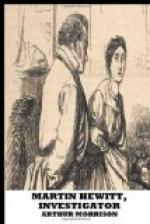At this moment a clerk from the landlord’s office arrived and handed Nettings a paper. “Here you are,” said Nettings to Hewitt; “they’ve found a specimen of Goujon’s handwriting at last, if you’d like to see it. I don’t want it; I’m not a graphologist, and the case is clear enough for me anyway.”
Hewitt took the paper. “This” he said, “is a different sort of handwriting from that on the paper. The red-ink note about the avenger of the tortoise is in a crude, large, clumsy, untaught style of writing. This is small, neat, and well formed—except that it is a trifle shaky, probably because of the hand injury.”
“That’s nothing,” contended Nettings. “handwriting clues are worse than useless, as a rule. It’s so easy to disguise and imitate writing; and besides, if Goujon is such a good penman as you seem to say, why, he could all the easier alter his style. Say now yourself, can any fiddling question of handwriting get over this thing about ’avenging the tortoise’—practically a written confession—to say nothing of the chopper, and what he said to the housemaid as he left?”
“Well,” said Hewitt, “perhaps not; but we’ll see. Meantime”—turning to the landlord’s clerk—“possibly you will be good enough to tell me one or two things. First, what was Goujon’s character?”
“Excellent, as far as we know. We never had a complaint about him except for little matters of carelessness—leaving coal-scuttles on the staircases for people to fall over, losing shovels, and so on. He was certainly a bit careless, but, as far as we could see, quite a decent little fellow. One would never have thought him capable of committing murder for the sake of a tortoise, though he was rather fond of the animal.”
“The tortoise is dead now, I understand?”
“Yes.”
“Have you a lift in this building?”
“Only for coals and heavy parcels. Goujon used to work it, sometimes going up and down in it himself with coals, and so on; it goes into the basement.”
“And are the coals kept under this building?”
“No. The store for the whole row is under the next two houses—the basements communicate.”
“Do you know Rameau’s other name?”
“Cesar Rameau he signed in our agreement.”
“Did he ever mention his relations?”
“No. That is to say, he did say something one day when he was very drunk; but, of course, it was all rot. Some one told him not to make such a row—he was a beastly tenant—and he said he was the best man in the place, and his brother was Prime Minister, and all sorts of things. Mere drunken rant! I never heard of his saying anything sensible about relations. We know nothing of his connections; he came here on a banker’s reference.”
“Thanks. I think that’s all I want to ask. You notice,” Hewitt proceeded, turning to Nettings, “the only ink in this place is scented and violet, and the only paper is tinted and scented, too, with a monogram—characteristic of a negro with money. The paper that was pinned on Rameau’s breast is in red ink on common and rather grubby paper, therefore it was written somewhere else and brought here. Inference, premeditation.”




